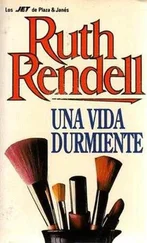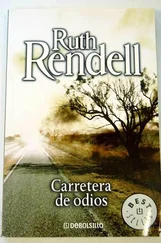Arthur went into the gents, where he tore the Bristol letter into small pieces and flushed them down the pan. There was a finality in this act which both pleased and frightened him. No going back now, no possibility of restoring the letter with another explanatory note. The deed was done and his revenge accomplished. Would the knowledge of that be sufficient to sustain him till he was home again? Could he get home in safety? As he emerged once more into the cocktail bar, the fear of himself began to return. But all the same, he bought another small brandy. He was deferring his departure from the Grand Duke until the last possible moment. It was twenty minutes to eleven. In his absence, someone had taken his seat and he was obliged to stand in a corner by the glass partition which divided this section from the saloon. The glass was frosted but with a flower pattern on it of clear glass. Glancing through a clear space, the shape of a petal, Arthur saw a familiar profile some three or four yards away.
Fortunately, it was the profile and not the full face of Jonathan Dean that he saw, for he was sure Dean hadn’t seen him. He moved away quickly, elbowing through the crowd. Dean’s mouth had been flapping like the clapper of a briskly rung handbell, so he was obviously talking to an unseen person. Very likely, unseen people . Brian Kotowsky and maybe Anthony Johnson and that black man as well. Birds of a feather flock together. He must get out.
It was only when he was out in the street that he questioned that compulsion of his. If he meant to go straight home, what did it matter who saw him or what witnesses there were to his absence from 142 Trinity Road? Or didn’t he mean to go straight home, but to wander the streets circuitously, the pressure in his head mounting, until the last permutation of the pattern was achieved? Arthur shivered. There was a bus stop a few yards down the High Street from the Grand Duke, but he didn’t want a bus which would take him no nearer Trinity Road than the Waterlily. A taxi, on the other hand, would deposit him at his door.
Taxis came down this way, he knew, returning to the West End after dropping a fare in North Kenbourne. But the minutes passed and none came. Ten to eleven. Soon the Grand Duke would close and disgorge its patrons onto the pavement. On the opposite side of the street Arthur could see the edge of the thickly treed mass of Radclyffe Park. Its main gate was closed, but the little iron kissing gate, the entry to a footpath which skirted the park, couldn’t be closed. He saw a woman pass through this gate, her shadow, before she entered the dark path, streaming across the lighted pavement. His heart squeezed and he clenched his hands. Maureen Cowan, Bridget O’Neill …
At last a taxi appeared. He hailed it feverishly and asked the driver for Trinity Road.
“Where might Trinity Road be?”
Arthur told him.
“Sorry, mate. I’m going back to town and then I’m going to my bed. I’ve been at the wheel of this vehicle since nine this morning, and enough is enough.”
“I shall note down your number,” Arthur said shrilly. “You’re obliged to take me. I shall report you to the proper authority.”
“Screw you and the proper authority,” said the driver, and moved off.
The last K.12 bus would pass at two minutes to eleven. Arthur decided he had no choice but to get on it, but at the Waterlily stop avoid Oriel Mews and walk home by the bright lighted way of Magdalen Hill. Yet it took all his self-control to remain at that bus stop and not set off on foot, to take the way the woman had taken or to follow the serpentine course of Radclyffe Lane which, passing at one point between acres of slum-cleared land, at another between terraces of squat houses and mean little shops, at last came to the hospital, the bridge, and the grey-grassed embankment of Isembard Kingdom Brunel’s railway. But as the temptation to do this became intolerable, the K.12 appeared over the brow of the rise from the direction of Radclyffe College.
Arthur went inside and the bus began to move. But it slowed again and stopped for the flying figure of a woman in a long, black, hooded cloak who had rushed from the Grand Duke to catch it. There were no more seats inside and she went upstairs.
The bus moved along fast because there wasn’t much traffic at that time of night. It passed the cemetery where Maureen Cowan had plied her trade and where Auntie Gracie lay in the family plot beside her father and mother. It detoured along a one-way street and returned briefly to the High Street before turning up Kenbourne Lane. And still, all along the route, red and green and silver flashes pierced the cold dark curtain of sky, breaking at their zeniths into tumbling cascades of sparks.
They took the right-hand turn into Balliol Street, and Arthur—who seldom rode on buses but who, when he did, was always ready to get off them a hundred yards before his stop—began to edge out of his seat. The black hooded shape was already waiting on the platform. Like a monk or a great bird, he thought. She was the first to alight, as if nervously anxious to get home.
The Waterlily was closed. All the shops were closed, and as he looked along the length of Balliol Street, he saw the light in the window of Kemal’s Kebab House go out. But lights there were in plenty, amber squares dotted haphazardly across house fronts, street lights like wintergreen drops, the high-rise tower a pharos with a hundred twinkling eyes. Scattered on the pavement were the blackened paper cases of used fireworks. But there were no people, no one but he and the cloaked woman who fluttered away across the mews entrance towards Camera Street. An occasional car passed.
Arthur stood still. He looked through the window of the public bar of the Waterlily, but he watched the woman from the corner of his eye. A cruising car had drawn up beside her, delaying her. The driver was saying something. Arthur thought he would count up to ten, by which time she would have turned into Camera Street or gone with the man, be lost to him, he and she safe, and then he would turn and make for Magdalen Hill. But before he had got to five, he saw her recoil sharply from the car and begin to run back the way she had come. His heart ticked, it swelled and pounded. There were three white posts under the mews arch. No car could pass into it from this end. But she passed into it. The car seemed to give a shrug before it slid away down the hill, leaving her for easier, more complaisant prey.
Arthur too went into Oriel Mews, walking softly as a cat. It was dark in there, sensuously, beautifully dark. She was walking fast—he could just make out the grotesque flapping shape of her—but he walked faster, passing her and hearing the sharp intake of her breath as he brushed the skirts of her cloak.
Then, behind him, she fell back, as he had known she would. She would linger until she saw his silhouette against the lighted mouth at the Trinity Road end, until she saw him disappear. He let her see him. But instead of stepping out into the light, he pressed himself against the cold bricks of the mews wall and eased back a yard, two yards. He smelt her. He couldn’t see her.
His tie was very tightly fastened and he had to wrench at it to get it off. His strength was such that if it had indeed been made of the metal it resembled he would still have possessed the power to get it free. Fireworks were hissing and breaking in his head now. The last of them fell into a million stars as the flapping hooded creature closed upon him and he upon her.
She didn’t cry out. The sound she made came to his acute ears only, the gurgle of ultimate terror, and the smell of her terror was for his nostrils alone. He never felt the touch of her hands. She fell on the stones like a great dying bird, and Arthur, rocking with an inner tumult, let her weight rest heavily on his shoes until at last, precisely and fastidiously, he shifted his feet away.
Читать дальше











